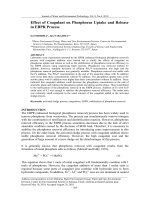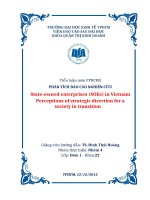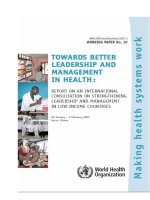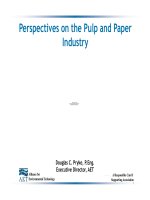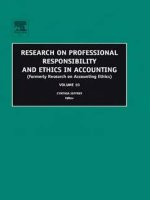Perspectives on kurdistans economy and society in transition
Bạn đang xem bản rút gọn của tài liệu. Xem và tải ngay bản đầy đủ của tài liệu tại đây (5.64 MB, 591 trang )
Perspectives on Kurdistan's Economy
and Society in Transition
Perspectives on Kurdistan's Economy
and Society in Transition:
Volume II
Edited by
Almas Heshmati, Alan Dilani
and Serwan M.J. Baban
Perspectives on Kurdistan's Economy and Society in Transition: Volume II,
Edited by Almas Heshmati, Alan Dilani and Serwan M.J. Baban
This book first published 2013
Cambridge Scholars Publishing
12 Back Chapman Street, Newcastle upon Tyne, NE6 2XX, UK
British Library Cataloguing in Publication Data
A catalogue record for this book is available from the British Library
Copyright © 2013 by Almas Heshmati, Alan Dilani and Serwan M.J. Baban and contributors
All rights for this book reserved. No part of this book may be reproduced, stored in a retrieval system,
or transmitted, in any form or by any means, electronic, mechanical, photocopying, recording or
otherwise, without the prior permission of the copyright owner.
ISBN (10): 1-4438-4836-0, ISBN (13): 978-1-4438-4836-7
CONTENTS
Speech of President Massoud Barzani ...................................................... xv
Speech of Prime Minister Nechirvan Barzani ....................................... xviii
Acknowledgement of Financial Support ............................................... xxvi
Biography of the Editors....................................................................... xxvii
List of Editors and Contributors ............................................................ xxix
List of Abbreviations ............................................................................ xxxii
Chapter One ................................................................................................ 1
Introduction and Summary of Contributions
Almas Heshmati, Alan Dilani and Serwan M.J. Baban
Part I: Agriculture and Sustainable Development
Chapter Two ............................................................................................. 12
Achieving Sustainable Food Production and Security in Iraqi Kurdistan:
Challenges and Opportunities
Serwan M. J. Baban
1. Introduction...................................................................................... 12
2. Characterising Agriculture: Issues and Possible Solutions .............. 14
3. Planning for a Sustainable Future .................................................... 16
4. The Priorities and Objectives ........................................................... 19
5. The Policies ..................................................................................... 22
6. Risks and Uncertainties ................................................................... 24
7. Conclusions...................................................................................... 24
8. References........................................................................................ 25
Appendix ............................................................................................. 27
Chapter Three ........................................................................................... 32
Building a Secure Future through Realizing Sustainable Development
in the Federal Region of Kurdistan, Iraq
Serwan M. J. Baban
1. Introduction...................................................................................... 33
2. Factors Threatening Sustainable Development in Southern
Kurdistan ............................................................................................. 36
3. Living with Information Poverty and Achieving Sustainable
Development. ....................................................................................... 41
Contents
vi
4. Sustainable Development in Southern Kurdistan: a Way Forward ..... 42
5. Conclusions...................................................................................... 45
6. References........................................................................................ 46
Chapter Four ............................................................................................. 48
Legal Actions Against Landmine Users
Almas Heshmati and Nabaz T. Khayyat
1. The Principle of Military Necessity for the Use of Landmines
and Cluster Munitions.......................................................................... 51
2. Principle of Proportionality ............................................................. 55
3. Words of Caution about Mine Action Responsibilities .................... 58
4. Policy Recommendations ................................................................ 60
5. Conclusions about Legal Actions against Landmine Users ............. 61
6. References........................................................................................ 62
Chapter Five ............................................................................................. 64
Pistacia Atlantica Kurdica, the Kurdish Medicinal Plant
Mohammad Sharif Sharifi
1. Introduction...................................................................................... 64
2. Experimental .................................................................................... 70
3. Results and Discussion .................................................................... 74
4. References........................................................................................ 80
Part II: Diaspora
Chapter Six ............................................................................................... 86
Immigration and Identity Crisis among Kurdish Youth in Denmark
Fatima Anamaghi and Almas Heshmati
Abstract ................................................................................................ 86
1. Introduction...................................................................................... 87
2. Why do People Choose to Migrate? ................................................ 88
3. Why do Kurdish people Choose to Migrate? ................................... 89
4. The Migration of Young Kurdish People ......................................... 91
5. Erik Erikson’s Theory of Identity Development .............................. 92
6. Setting .............................................................................................. 96
7. Factors that Influence Youth Migrant Identity ................................. 96
8. Types of Migrant Youth Adjustment to Reduce Identity Crisis...... 101
9. Summary and Conclusion .............................................................. 103
10. References.................................................................................... 105
Perspectives on Kurdistan’s Economy and Society in Transition
vii
Chapter Seven......................................................................................... 109
The Kurdish Diaspora: A New Subject Formation in Transnational Space
Ahmet Hamdi Akkaya
Abstract .............................................................................................. 109
1. Introduction.................................................................................... 110
2. The Formation of Kurdish Diaspora .............................................. 112
3. The Victim Diaspora and the Myth of Return ................................ 115
4. The Diaspora and Identity .............................................................. 117
5. Conclusion ..................................................................................... 120
6. Bibliography .................................................................................. 121
Part III: Education and Research
Chapter Eight .......................................................................................... 126
University of Kurdistan Hewler: A Possible Model for Establishing
Independent International Universities Within Developing Countries
Serwan M. J. Baban
Abstract .............................................................................................. 126
1. Introduction.................................................................................... 127
2. Main Issues and Challenges for Higher Education ........................ 129
3. University of Kurdistan: Hewler, UKH ......................................... 130
4. A Preliminary Evaluation of the Barriers to Progress .................... 135
5. A Preliminary Evaluation of the performance over the period
2009–2012 ......................................................................................... 136
6. Conclusions and Discussions ......................................................... 138
7. References...................................................................................... 139
Chapter Nine........................................................................................... 141
Multidisciplinary and Interdisciplinary Research and Education
in Kurdistan
Diako Ebrahimi
Abstract .............................................................................................. 141
1. Research and Education Systems................................................... 142
2. History of Research and Education................................................ 144
3. Pros and Cons of R&E Systems..................................................... 145
4. Which R&E System to Put in Place? ............................................. 148
5. Education in Kurdistan .................................................................. 149
6. References...................................................................................... 151
viii
Contents
Part IV: Health and Quality of Life
Chapter Ten ............................................................................................ 154
Evaluation of Cardiopulmonary and Ladca Dose in Left-Sided Breast
Cancer Patients by Utilizing the Deep Inspiration Breath-Holding
Technique
Mariwan Baker, Susanne Vallentin, Karen Andersen, Wiviann Ottosson
and David Sjöström
Abstract .............................................................................................. 154
1. Introduction.................................................................................... 155
2. Materials and Methods................................................................... 156
3. Results ........................................................................................... 160
4. Discussion ...................................................................................... 164
5. Conclusion ..................................................................................... 165
6. References...................................................................................... 165
Chapter Eleven ....................................................................................... 169
The Importance of Satisfactory Clinical Encounters in Health Outcomes
and Patient Satisfaction
Nabi Fatahi
Abstract .............................................................................................. 169
1. Introduction.................................................................................... 170
2. Communication Theory ................................................................. 171
3. General Practitioner Patient Communication ................................ 174
4. The Short Encounter ...................................................................... 177
5. Gender Perspective ........................................................................ 178
6. Conclusion ..................................................................................... 178
7. References...................................................................................... 179
Chapter Twelve ....................................................................................... 183
Rehabilitation and the Computerized Prosthetic Centre of Kurdistan
Sam Hakki and Syed K. Ali
Abstract .............................................................................................. 183
1. Introduction.................................................................................... 184
2. Methods ......................................................................................... 187
3. Results ........................................................................................... 190
4. Conclusion ..................................................................................... 192
5. References...................................................................................... 193
Perspectives on Kurdistan’s Economy and Society in Transition
ix
Chapter Thirteen ..................................................................................... 196
The Kurdish Nation and Its Quality of Life: Field Analysis
within the Kurdish Population 1999–2011
Fereydoon Rahmani
Abstract .............................................................................................. 196
1. Introduction.................................................................................... 197
2. Modern Developments and Approaches in Quality of Life
Research............................................................................................. 198
3. Conclusion ..................................................................................... 206
4. References...................................................................................... 207
Part V: Industry
Chapter Fourteen .................................................................................... 210
The Roll of Automation and Mechatronics in the Creation of a Modern
Industrialized Nation
Hogir Fatih Rasul
Abstract .............................................................................................. 210
1. Introduction.................................................................................... 211
2. Automation and Mechatronics: the Key Prerequisites for
Industrialization ................................................................................. 212
3. The Impact of the History and Geopolitical Situation
on Industrial Development................................................................. 216
4. Industrial Policy and R&D Strategy .............................................. 217
5. Sustainable industrial development ............................................... 222
6. Summary and Conclusions ............................................................ 223
7. References...................................................................................... 227
Part VI: Information Technology and E-Government
Chapter Fifteen ....................................................................................... 236
An Overview of E-Government and Best Strategies for its Adoption
in Developing Countries
Wafa Khorsheed and Asad Khailany
Abstract .............................................................................................. 236
1. Introduction.................................................................................... 237
2. What is E-Government? ................................................................. 238
3. What are the Benefits of E-Government? ...................................... 239
4. E-Government Maturity Model ..................................................... 240
5. Development Approach ................................................................. 242
x
Contents
6. What are the Barriers That Stand in the Path of E-Government
Adoption? .......................................................................................... 245
7. Adoption Strategies ........................................................................ 247
8. References...................................................................................... 250
Chapter Sixteen ...................................................................................... 251
E-Government in the Kurdistan Region of Iraq: Some Thoughts
on Implementation
Zaigham Mahmood
Abstract .............................................................................................. 251
1. Introduction.................................................................................... 252
2. E-Government (EG) in Developing Countries ............................... 253
3. Kurdistan Region of Iraq (KRI) and the Kurdistan Regional
Government (KRG) ........................................................................... 255
4. EG Adoption in KRI ...................................................................... 256
5. Some Thoughts on the Implementation of EG in the KRI ............. 262
6. Conclusion ..................................................................................... 264
7. References...................................................................................... 265
Chapter Seventeen .................................................................................. 268
Knowledge Society and Sustainable Quality Higher Education
in Kurdistan
Farzad Sanati
Abstract .............................................................................................. 268
1. Introduction.................................................................................... 269
2. The Current State of Higher Education in Kurdistan ..................... 270
3. The Kurdistan Research Sustainability Model ............................... 273
4. Centre for Science Informatics and Research Management
(CSIRM) ............................................................................................ 277
5. Conclusion ..................................................................................... 278
6. References...................................................................................... 279
Chapter Eighteen .................................................................................... 281
Mobile-Government for Enhanced Public Service Delivery in Advancing
Economies: the Case of the Kurdistan Region of Iraq
Shareef M. Shareef and Johnnes Arreymbi ............................................ 281
Abstract .............................................................................................. 281
1. Introduction.................................................................................... 282
2. Related Works ................................................................................ 284
3. Methodology .................................................................................. 286
4. Role of Information and Communications Technology in KRI ..... 287
Perspectives on Kurdistan’s Economy and Society in Transition
xi
5. Proposed Mobile Government Application.................................... 293
6. Conclusion ..................................................................................... 296
7. References...................................................................................... 297
Part VII: Infrastructure and Development
Chapter Nineteen .................................................................................... 302
A Review of the Regional Development Strategy for the Kurdistan
Region 2012–2016
Almas Heshmati
Abstract .............................................................................................. 302
1. Background .................................................................................... 303
2. Outline and Summary of the Strategy Plan .................................... 305
3. Macroeconomics ............................................................................ 308
4. Strength and Weaknesses of the Development Strategy ................ 311
5. Recommendations for the Ministry of Planning ............................ 315
6. Potential Areas of Development .................................................... 318
7. Summary and Conclusion .............................................................. 320
8. References...................................................................................... 322
Chapter Twenty....................................................................................... 324
Fostering Kurdish Innovation to Fuel Regional Development
and Economic Growth
Said Ismail Hakki, Shereen Said Hakky, Lt. Gen. Jay Garner
and Lt. Gen. Ronald Hite
Abstract .............................................................................................. 324
1. Introduction.................................................................................... 325
2. Policy ............................................................................................. 325
3. Policy Framework .......................................................................... 327
4. Resourcing ..................................................................................... 330
5. Implementation .............................................................................. 332
6. Needs Specific to KRG .................................................................. 334
7. Conclusion ..................................................................................... 335
Chapter Twenty-One............................................................................... 338
Strategic Foresight for Economic Growth and Sustainable Infrastructure
in Iraqi Kurdistan: a Vision for 2030
Nazar Fatih Rasul
Abstract .............................................................................................. 338
1. Introduction.................................................................................... 338
2. Foresight ........................................................................................ 339
xii
Contents
3. Methodologies for Foresight and Analysis of Future Scenarios .... 345
4. Foresight: Experiences from Other Countries ............................... 350
5. Foresight for Sustainable Growth in the Kurdistan Region ........... 357
6. Summary and Conclusions ............................................................ 366
7. References...................................................................................... 367
Chapter Twenty-Two .............................................................................. 370
Application of Public-Private Partnerships (PPP) to Develop
Infrastructures in Kurdistan
Mosleh Rostami and Sassan Zhian
Abstract .............................................................................................. 370
1. Introduction.................................................................................... 371
2. Benefits and obstacles of PPPs ...................................................... 372
3. PPP contract types.......................................................................... 373
4. A Conceptual Classification Framework of a PPP arrangement .... 374
5. Tendering process .......................................................................... 375
6. Evaluation Methods ....................................................................... 376
7. Control, monitoring mechanism components and quality
assurance ............................................................................................ 377
8. Funding strategy, technique and instruments ................................. 378
9. Debt and equity component ........................................................... 379
10. The role of public finance in PPPs: considerations
for government................................................................................... 382
11. Models for PPPs in Kurdistan ...................................................... 385
12. Recommendations for PPP projects in Kurdistan ........................ 392
13. Conclusion ................................................................................... 397
14. References.................................................................................... 400
Part VIII: Language and Human Rights
Chapter Twenty-Three ............................................................................ 402
A Comparative Study of the Kurdish Minority Rights to Language
in Iraq and Turkey
Chemen Bajalan
Abstract .............................................................................................. 402
1. Introduction.................................................................................... 402
2. International Standards for Minority Language Rights ................. 403
3. Kurdish Rights to Language in Iraq ............................................... 410
4. Kurds Right to Language in Turkey............................................... 421
5. Conclusions.................................................................................... 427
6. Bibliography .................................................................................. 429
Perspectives on Kurdistan’s Economy and Society in Transition
xiii
Chapter Twenty-Four .............................................................................. 433
Human Rights Education in Kurdistan, Iraq: Enabling Teachers
to Contribute to Processes of Gender Equality, Democracy
and Development
Audrey Osler and Chalank Yahya
Abstract .............................................................................................. 433
1. Introduction.................................................................................... 434
2. Education Policy Reforms in a Post-Conflict Context ................... 435
3. Diversity and Gender in Iraqi Kurdistan........................................ 438
4. The Right to Human Rights Education .......................................... 441
5. Our Methods and Fieldwork .......................................................... 443
6. Professionals’ Perspectives ............................................................ 445
7. Ways Forward: Principles and Strategies ....................................... 455
8. References...................................................................................... 456
Part IX: Politics
Chapter Twenty-Five .............................................................................. 460
The Feasibility of an Independent Kurdish State in Iraq
Niyaz Barzani
Abstract .............................................................................................. 460
1. Introduction.................................................................................... 460
2. Literature Review .......................................................................... 462
3. Theoretical Framework .................................................................. 463
Applying Statehood Criteria and Theories of Recognition
to the Kurdistan Region of Iraq ......................................................... 468
4. Internal Dimensions of Declaring Independence ........................... 468
5. External Dimensions and Implications of Declaring
Independence ..................................................................................... 471
6. Why Has Independence Not Been Achieved? ............................... 478
7. Conclusion ..................................................................................... 480
8. Bibliography .................................................................................. 483
Chapter Twenty-Six ................................................................................ 487
Beneficiaries Do Matter: The KRG’s Experience in Implementing
Social Security Programmes
Muslih Irwani
Abstract .............................................................................................. 487
1. Introduction.................................................................................... 488
2. Politics and Social Policy Background .......................................... 488
3. Theory: Policy Implementation ..................................................... 493
xiv
Contents
4. Methodology .................................................................................. 496
5. Social Security Programmes in the Politically Underdeveloped
Kurdistan Region ............................................................................... 497
6. Concluding Remarks...................................................................... 504
7. References...................................................................................... 505
Chapter Twenty-Seven............................................................................ 509
Kurdistan Regional Government from Nation-Building to Nation-State
Building
Sait Keskin
1. Introduction.................................................................................... 509
2. Historical Legacy of the Kurdistan National Liberation
Movement’s Political Struggle as the Dynamics of Nation
Building ............................................................................................. 510
3. Opportunities and Challenges: The KRG in the Nation
Building Process ................................................................................ 512
4. Building Institutions as the Fundamental Elements
of Nation Building to Nation State Building .................................... 517
5. Conclusion ..................................................................................... 520
6. Bibliography .................................................................................. 522
Part X: Summary Report of the Congress
Chapter Twenty-Eight............................................................................. 524
Building a Nation with Diaspora Support: Report and Reflections
from World Kurdish Congress 2012
Alan Dilani and Carol Prunhuber
1. Introduction.................................................................................... 524
2. Overview of WKC 2012 ................................................................ 525
3. Organization of WKC Prior To Conference ................................... 528
4. WKC Organization During the Conference ................................... 530
5. The Future Of WKC ...................................................................... 538
Appendix A: World Kurdish Congress 2012 Program............................ 539
Index of Authors ..................................................................................... 545
Subject Index .......................................................................................... 551
SPEEC
CH OF PRESIDENT
R
T MASSOU
UD BARZ
ZANI
At th
he 2nd Worrld Kurdish
h Congress,, Saad Pala
ace
C
Conference Centre, Errbil, 13 Octtober 2012
xvi
Speecch of President Massoud Barzaani
Persspectives on Kuurdistan’s Econ
nomy and Socieety in Transition
n
xvii
SPEECH OF PRIME MINISTER NECHIRVAN
BARZANI1
At the 2nd World Kurdish Congress, Saad Palace
Conference Centre, Erbil, 13 October 2012
Ladies, gentlemen and distinguished guests, good morning.
I wanted very much to be here with you today, but unfortunately I have
had to change my plans due to some unforeseeable circumstances.
In any event, I would like to welcome you to the second day of this
important forum and assure you that this initiative has my full support.
This congress has been designed to draw on your expertise in order to
help address the many challenges that we face, and I have no doubt that
this is a project that will continue to benefit all of us for many years to
come.
1. Challenges facing the Kurdish nation
Never before in our history have the Kurds seen as much opportunity, nor
as much at risk as we do today. The challenge for all of us is to find ways
through the current uncertainties to build a bright future for all generations
of Kurds, wherever they may live.
In all of the different places we live, we each have our unique
challenges. Here in the Kurdistan Region we enjoy a greater level of
political and economic freedom than we have ever had before. Yet, we find
ourselves locked in a struggle to see the implementation of the
constitutional guarantees that give the greatest hope for the future of all
Iraq’s peoples.
Our brothers in neighbouring countries each face their own unique
challenges, and those of you who are living in the Diaspora have faced the
difficulties of relocation and starting over, as well as the ongoing struggle
to remain connected to your family and culture.
1
The speech was read by Minister Ali Saeed, as the Prime Minister was unable to
attend.
Perspectives on Kurdistan’s Economy and Society in Transition
xix
However, whatever difficulties there may be, there has never been a
time that holds more promise for our people than now. Major
developments and changes are taking place throughout the Middle East
and the broader region, and the progress that we have achieved here in the
Kurdistan Region of Iraq has opened many new opportunities. We find our
brothers and sisters moving into new areas of professional and political
life throughout the developed world, and families that have fled
persecution are now finding peace and prosperity in their new homes.
2. Developing common views
We live in changing and uncertain times, and it is not clear what the future
may hold for any of us. However, the greatest single issue facing the
Kurdish nation now is that we find ourselves pulled apart by issues that are
specific to our own unique circumstances, and these divisions keep us
from realizing our full national potential.
We need to develop common objectives and strategies which support
our people wherever they might live. We need to reach an agreement to
rally support around broad principles:
a. The legitimacy of the culture, history and heritage of our people must
not be denied, or undermined.
We have begun major initiatives to preserve and explore our heritage
through cooperative archeological projects, through restoration projects on
significant historical sites, and through beginning to establish museums
and cultural centres in areas throughout the Region.
From the restoration of the Erbil citadel and the museums in this city,
to the ancient stone carvings in Duhok, Shanidar cave, the three tanks
marking the limit of Saddam’s advance at Kore, the Red Prison in
Slemani, and the Halabja memorial, we are working to ensure that future
generations do not forget where we have come from or what it has cost us
to get here.
Along with many other government institutions, the Kurdistan
Regional Government (KRG) Ministry of Martyrs and Anfal Affairs has
done a great deal to raise awareness and help gain recognition for the
genocide against our people, and your support and contributions to this
effort could have a significant impact on the lives and mental wellbeing of
those who have paid the greatest price for the freedoms that so many of us
now enjoy. You can help on every level, from talking to your friends, to
organising petitions and information campaigns or leveraging political
connections to draw attention to this issue.
xx
Speech of Prime Minister Nechirvan Barzani
The relevant KRG ministries are both working to build on other efforts
in this sector as well. Archeological projects continue to progress in
partnership with major universities abroad, and efforts are under way to
increase public access to the many historic sites here in the Region
through better maps, guides and literature on them and through initiatives
to protect the sites themselves.
Even with all of this, there is still much that can be done in these areas
as well. Regardless of your level of access to funding or experts in a
specific field, you can get involved through helping organise events to
celebrate our national holidays in your communities abroad or further
improve and expand the preservation of our history and culture here
through pursuing your own support initiatives.
b. Kurds everywhere are entitled to participate in their own decisionmaking within democratic, federal, and pluralistic state structures.
As John Locke articulated more than 300 years ago, governments are
an extension of the people that they govern. Accordingly, our relationship
with government is such that we each, individually give our consent to be
governed in order to ensure our greater good and overall security. Because
we all enjoy the freedom of this choice, the right to just representation in
government is a basic human right that has been given to us by nature
itself.
The 1992 elections which established our Parliament and led to the
creation of our government, and the elections that we now hold to
determine its makeup are the primary means by which we recognize and
exercise this natural right.
The protection of this natural right is also why we have worked so hard
to ensure the implementation of the Iraqi Constitution, the rule of law and
equal representation in the Federal Government. The atrocities of our past
have taught us that this is a right we cannot take for granted. We will never
again accept a Federal Iraqi Government that does not recognize our rights
through including us as active participants in its operations.
As our brothers and our natural representatives abroad, you are
perfectly situated to support us in this effort. You can help to preserve all
of our rights by ensuring that the excesses of the Federal Iraqi Government
do not go unnoticed. You can articulate the circumstances and realities of
Kurdistan to your friends and colleagues abroad, and you can help build
partnerships to expand and improve the strength and effectiveness of our
civil society here in Kurdistan.
Perspectives on Kurdistan’s Economy and Society in Transition
xxi
c. Our objective must be a peaceful and democratic transformation to a
more modern and pluralistic environment where our people can pursue
their hopes and dreams free from fear and persecution.
The struggle to ensure one’s rights is often very tough, and there have
been many times in human history when armed resistance was required in
order to exercise these rights. However, we do not live in one of those
times. The resistance movements of Mahatma Gandhi, Martin Luther
King, Nelson Mandela all revealed that major political victories can be
achieved through peaceful means.
We must continue to struggle for our right to use our language, to
celebrate our heritage, to have a voice in our governance and to be treated
as equal citizens. These are all reasonable and defensible rights; however,
we must not allow our actions in protection of them to overshadow or
remove our dignity as we continue the struggle. We must agree to continue
achieving recognition of these rights through peaceful means.
Many peaceful avenues are now available to us. Through the opening
of Kurdistan to the international community since the fall of the former
regime, our story is now being told all over the world. We now have 26
foreign representatives here in Erbil and 14 KRG representations abroad
that all help bring international attention to these issues.
Hundreds of NGOs and other civil society institutions are already
operating here in the Region. We have members of our Diaspora in
democratic institutions and positions of influence around the world.
Universities, academic institutions and international courts are open to us,
and we have an active press corps, though it admittedly needs better
training and an oversight body to ensure adherence to international
standards of journalism.
All of these provide channels for action that will not undermine our
struggle for international recognition and sponsorship of our rights.
d. Kurds everywhere need to work together as one to achieve rights and
liberties for all our people, regardless of where they may live.
One of the oldest and most proven factors of political success is the
strength of unity behind a common cause. As the old saying goes, “United
we stand, but divided we fall.”
We must take this ancient but simple truth to heart. We must look
beyond our own private circumstances, and even beyond those of our
immediate community. If we can all learn to reach for something bigger, if
we can learn to subject our own private ambitions for the good of our
greater cause, then I believe we will find our goals to be both manageable
and well within our grasp.
xxii
Speech of Prime Minister Nechirvan Barzani
No matter what field you are in or what your expertise may be, I
encourage you to be a force for unity. Lead the way through being an
example of how we can work together, and challenge others to do the
same.
3. Value and help from the Kurdish Diaspora
We have of course made much progress, but there is still much more that
needs to be done, and we need your varied education and experience to
achieve our goals.
We cannot do this alone, and this is why we have given such broadbased support for this congress. This is an excellent opportunity for us to
explore how we can all learn and benefit from each other in order to move
forward.
With this important event as an example, the KRG can and is doing
much to ensure our collective progress. However, public resources are
limited and our future growth will be guaranteed by the strength of the free
market and the success of the civil society in Kurdistan.
We can use your assistance in both the public and private sectors, but
the private sector is where the greatest impact can be made. There is an old
saying that, “necessity is the mother of invention,” and there is nowhere
that creativity and invention are given more freedom to evolve than in the
private sector.
We are surrounded by “necessities” in nearly every sector. You do not
need to wait for someone to tell you where you can make a difference; find
an area that you can improve, and take the initiative to make it happen.
4. Specific areas of interest
Many of you have experience in vital are.as of our economy, and we
encourage you to utilize your talents for our greater good.
Education
At a congress involving academics from a wide variety of sectors and
backgrounds, it would be unforgivable of me if I failed to mention the
significant efforts that can be made in this important field.
From spreading awareness through your daily involvement with
students and colleagues, to writing papers, conducting research
programmes and building links between our respective universities, the
Perspectives on Kurdistan’s Economy and Society in Transition
xxiii
sky is the limit to how effective you can be in promoting unity and
progress in a wide variety of sectors.
We are now partnering with a great number of international
universities through our HCDP scholarship programme, and you could
also help to contribute in this either through encouraging the participation
of your own institutions, or through mentoring scholarship recipients as
they live and work abroad, or both.
Agriculture
Though I will leave the details of this topic Minister Baban here, this
sector is one of the most important areas that needs improvement both
here in the Kurdistan Region and for the rest of Kurdistan as well. In
addition to the tremendous political benefit of providing food security for
our people, this sector also has the potential to provide a renewable source
of income as well as many new jobs for our people.
As you all know, our people have a rich agricultural history, and our
land and water resources indicate that we could easily be a net exporter of
many food products.
Your expertise in any part of this field could be tremendously useful,
from helping establish functional packaging and distribution networks, to
introducing new practices and technology, to helping establish research
centres and partnerships with agricultural programmes in foreign
universities. We could also benefit greatly from the development of
aquaculture and the introduction of many new crop varieties to the Region.
Healthcare
Many of you are probably aware that the limits of our local healthcare
system have been receiving a great deal of attention lately. From concerns
over the quality of medicine to the availability of professional care, much
has been made of the areas that need improvement in our system.
The KRG has responded to these concerns by launching a number of
programmes, including a major quality control programme for
pharmaceuticals in the Region which was launched just a few weeks ago.
However, many of you have obtained expertise in this field during your
time abroad, and your assistance through providing training workshops,
telemedicine consultation, hospital partnerships and other initiatives would
be very helpful.
xxiv
Speech of Prime Minister Nechirvan Barzani
Archeology and tourism
Another area that is of particular importance to our future is the
preservation and public display of our national historic treasures. The full
development of this sector would provide a wealth of information on our
history and heritage, but it would also facilitate further international
awareness of our needs and struggles, as well as create a significant
additional source of annual revenue.
As part of the ‘birthplace of civilization’, the Kurdistan Region alone
has over 3,000 known archaeological sites, several of which will likely
soon become UNESCO World Heritage Sites. Many other sites exist just
across our borders, and there is no question that this is an area of
significance for all of Kurdistan.
Though our Region is still largely undiscovered by many in the
international community, we are now hosting around 2 million annual
tourists, and this number has grown by more than 30% for several years in
a row.
Your input in this sector by providing additional links to self-funded
research teams abroad or organizing professional artifact preservation,
museum development or tourism promotion projects would be a
significant contribution.
Other opportunities
As I mentioned before, there are literally limitless opportunities for your
efforts to make a difference here in Kurdistan, and choosing where you
will get involved is likely far less important that the fact of your
involvement itself.
You could make significant contributions to the fields of industry,
finance, health, communications, and many more.
However, whichever sector and in whatever capacity you choose,
please remember that unity must be our foundation if we want to achieve
overall success. Personal ambition and private gain must not be allowed to
continue driving a wedge of separation between us.
Regardless of your area of expertise or your level of success in your
field, you can help to spread awareness and build connections within the
communities where you work and live.
You can work with our KRG Representatives abroad to promote
solidarity amongst the Kurdish communities abroad and to keep our
language and culture alive.
Perspectives on Kurdistan’s Economy and Society in Transition
xxv
You can help to form partnerships in the industries and institutions
where you work in order to expand our local capacity and build bridges for
our people.
And finally, you can lead by setting an example of how to build unity
and cooperation in working toward our collective goals and encourage
others to do the same.
I would like to take this opportunity to thank you all for coming, and I
would like to extend a special thanks to all of those who worked to help
organise this important event.
I wish you all a productive congress.
Nechirvan Barzani
KRG Prime Minister
Erbil, 13 October 2012

